学术论文写作讲座
论文讲座心得体会(精选5篇)

论文讲座心得体会(精选5篇)论文讲座心得体会篇1论文讲座心得体会____年__月__日,我有幸参加了由学院组织的“论文写作与答辩”专题讲座。
这次讲座的主讲人是来自__大学的__教授,他从事教学工作长达__年,有着丰富的教学经验。
讲座的主题是关于学术论文的写作技巧、规范以及如何进行有效的答辩。
讲座的内容丰富多样,教授用深入浅出的方式讲解了学术论文写作的基本原则和技巧。
他强调了研究的重要性,告诫我们要有扎实的写作基础和严谨的学术态度。
讲座过程中,教授还分享了许多论文写作的实用技巧,如如何寻找合适的参考文献,如何设计合理的实验方案,以及如何有效地撰写和修改论文等。
在讲座过程中,我深刻地认识到了论文写作的重要性,并学到了很多实用的技巧和方法。
我意识到,写好一篇学术论文不仅需要扎实的学术基础,还需要良好的写作技巧和严谨的学术态度。
同时,我也明白了在答辩过程中如何有效地与评委进行交流的重要性。
通过这次讲座,我学到了很多实用的论文写作技巧和方法,例如:在写作过程中要时刻关注论文的逻辑性和条理性,要注重参考文献的选取和引用,以及要合理地设计实验方案和数据分析等。
同时,我也意识到了在论文写作过程中需要时刻保持严谨的学术态度,以确保论文的质量和准确性。
总的来说,这次讲座对我个人的学术研究和论文写作水平有了很大的提升。
我深刻地认识到了论文写作的重要性和技巧,并学到了很多实用的方法。
我感谢教授的精彩讲座,并期待在未来的学习和研究中能够更加深入地运用这些知识和技巧。
论文讲座心得体会篇2论文讲座心得体会X月X日晚,由数理学院举办的“数学建模”系列讲座之“数学建模与软件应用”在致远楼101教室开讲。
本次讲座由两位主讲人,分别是数学建模教研室主任王飞老师和来自台湾逢甲大学的李岳航教授。
两位老师就数学建模相关知识进行了深入剖析,并针对应用软件进行实例讲解。
在讲座中,王飞老师从数学建模的基本概念、数学建模的发展趋势、数学建模与计算机应用的关系等方面进行了深入讲解。
第三章 学术论文的撰写与格式(修改稿)

李剑鸣谈原始史料运用问题
2、搜集资料要全,运用材料要精 搜集材料:尽量涸泽而渔 陈垣作《元典章校补释例》,收集了1万条资料,最 后用到书中的只有1千条。 资料长编法:传统史学,按照课题内容与资料的内在 联系,将全部资料编排成一个粗略的系统,以便甄别 和比较,在此基础上选择最精当的史料进行写作。 对于史料的矛盾记载,郑天挺说:“对于记载矛盾的 材料,则应有交代。交代材料对不对和自己取舍的理 由。”
引文处理方式
• 原文照录:读者可以见到材料原貌,能够重新理 解判断。缺点是引文与行文脱节,减损行文流畅 性,增加文章篇幅。专门性、经典性材料照录。 但中间也要节略。 • 转述原意:“择其要语,浑括其意。”可以节省 篇幅,保持行文的一致性,使读者一目了然于材 料原意,但容易造成对原意的曲解误解。原文过 长、通论性文章多用转述 • 综述:叙述同一史实的多个材料要综述,精炼概括
第三讲:学术论文的撰写与格式
• 一、开题报告 • 1、开题报告: • 作者在论文选题确定之后所撰写的报请指导 教师及有关领导审批的选题计划。主要说明 选题的学术价值和自己的条件研究,以及准 备如何开展研究等问题,是对选题的简单论 证和设计。
2、开题报告的内容
(1)选题类别 (2)论文题目 (3)选题的目的和意义 (4)与本课题相关的国内外研究状况 (5)论文预计要解决的问题有何突破和创新
三、撰写文稿
(一)、史料的运用问题
冯友兰谈哲学史研究的史料运用问题
1、注意使用原始史料,少用或者不用转引史料 尝谓今人纂辑之书,正如今人之铸钱,古人采铜于 山,今人则买旧钱,名之曰废铜,以充铸而已。所 铸之钱既已粗恶,而又将古人传世之宝舂(chōng )剉(cuò)碎散,不存于后,岂不两失之乎? ——顾炎武《日知录》
学术论文写作第十讲
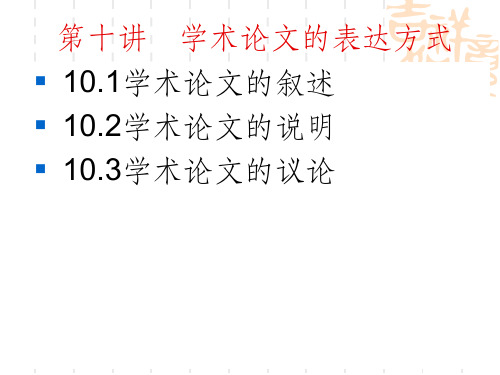
2020年12月21日星期一
精品
1
10.1学术论文的叙述 ▪ 10.1.1叙述的涵义 ▪ 10.1.2叙述的类型 ▪ 10.1.3叙述的要求
2020年12月21日星期一
精品
2
10.1.1叙述的涵义
精品
15
1.归纳法
▪ 归纳法就是从个别事例中归纳出一个一般性 的结论的推理方法。
▪ 先举例再归纳。欧阳修《五代史·伶官传序 》中,从后唐李存勖前期的勤政为业,励精图 治,使国家繁荣昌盛;后期贪图安逸,沉湎酒 色,终使国破身亡的事例。然后得出一般性的 结论:“忧劳可以兴国,逸豫可以亡身。”
2020年12月21日星期一
▪ 叙述就是对人物的经历、事物 本身发展变化的过程及场景、空 间的转换所作的述说和交代。
▪ 六要素
2020年12月21日星期一
精品
3
10.1.2叙述的类型
▪ 叙述可以分为概括叙述和具体叙述。
▪ 汪母年轻时温文尔雅,知情达理,是昆明有名的 “才女”。她孝敬公婆,相夫教子,生活在贤妻良母 的伊甸园里。抗战爆发后……
想象出“一顿丰盛的筵席”。阎连科的长篇小说《日光流年》
(1998)叙述中国华北偏僻的耙耧村人在村长司马蓝带领下
为了全村人都活过40岁这一理想而展开种种抗争行动的经过
。在这里,延长人的生理寿命并为此而不惜一切代价,成了全
村人的最高生活目标和追求。他们行动基本上是出于生理需要
,但这种生理需要竟同人的自我实现需要形成错综复杂的联系
202,0年令12月人21荡日星气期一回肠。
精品
5
10.1.3叙述的要求
学术论文写作指导讲座发言稿
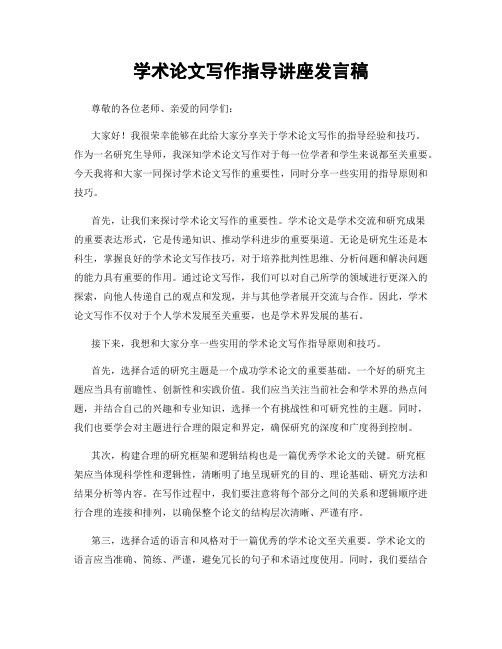
学术论文写作指导讲座发言稿尊敬的各位老师、亲爱的同学们:大家好!我很荣幸能够在此给大家分享关于学术论文写作的指导经验和技巧。
作为一名研究生导师,我深知学术论文写作对于每一位学者和学生来说都至关重要。
今天我将和大家一同探讨学术论文写作的重要性,同时分享一些实用的指导原则和技巧。
首先,让我们来探讨学术论文写作的重要性。
学术论文是学术交流和研究成果的重要表达形式,它是传递知识、推动学科进步的重要渠道。
无论是研究生还是本科生,掌握良好的学术论文写作技巧,对于培养批判性思维、分析问题和解决问题的能力具有重要的作用。
通过论文写作,我们可以对自己所学的领域进行更深入的探索,向他人传递自己的观点和发现,并与其他学者展开交流与合作。
因此,学术论文写作不仅对于个人学术发展至关重要,也是学术界发展的基石。
接下来,我想和大家分享一些实用的学术论文写作指导原则和技巧。
首先,选择合适的研究主题是一个成功学术论文的重要基础。
一个好的研究主题应当具有前瞻性、创新性和实践价值。
我们应当关注当前社会和学术界的热点问题,并结合自己的兴趣和专业知识,选择一个有挑战性和可研究性的主题。
同时,我们也要学会对主题进行合理的限定和界定,确保研究的深度和广度得到控制。
其次,构建合理的研究框架和逻辑结构也是一篇优秀学术论文的关键。
研究框架应当体现科学性和逻辑性,清晰明了地呈现研究的目的、理论基础、研究方法和结果分析等内容。
在写作过程中,我们要注意将每个部分之间的关系和逻辑顺序进行合理的连接和排列,以确保整个论文的结构层次清晰、严谨有序。
第三,选择合适的语言和风格对于一篇优秀的学术论文至关重要。
学术论文的语言应当准确、简练、严谨,避免冗长的句子和术语过度使用。
同时,我们要结合自己的学术风格和写作目的,选择合适的语气和态度,保持客观、中立的立场。
在进行文献综述和引用他人观点时,应当注明出处,避免抄袭和侵权问题。
最后,进行充分的反思和修改是一篇优秀学术论文的必要环节。
听论文的讲座心得体会
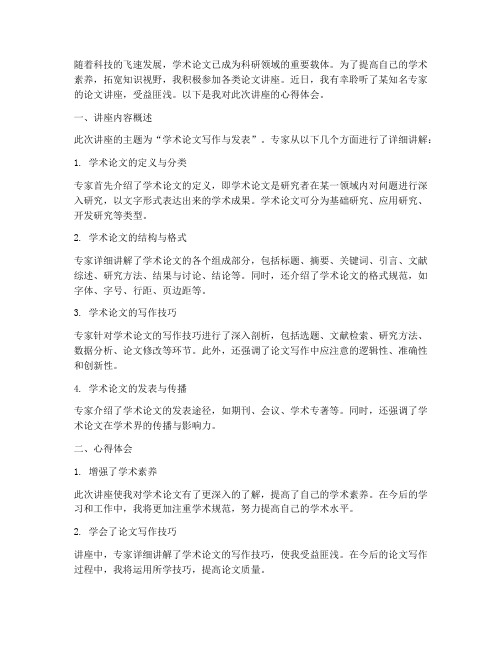
随着科技的飞速发展,学术论文已成为科研领域的重要载体。
为了提高自己的学术素养,拓宽知识视野,我积极参加各类论文讲座。
近日,我有幸聆听了某知名专家的论文讲座,受益匪浅。
以下是我对此次讲座的心得体会。
一、讲座内容概述此次讲座的主题为“学术论文写作与发表”。
专家从以下几个方面进行了详细讲解:1. 学术论文的定义与分类专家首先介绍了学术论文的定义,即学术论文是研究者在某一领域内对问题进行深入研究,以文字形式表达出来的学术成果。
学术论文可分为基础研究、应用研究、开发研究等类型。
2. 学术论文的结构与格式专家详细讲解了学术论文的各个组成部分,包括标题、摘要、关键词、引言、文献综述、研究方法、结果与讨论、结论等。
同时,还介绍了学术论文的格式规范,如字体、字号、行距、页边距等。
3. 学术论文的写作技巧专家针对学术论文的写作技巧进行了深入剖析,包括选题、文献检索、研究方法、数据分析、论文修改等环节。
此外,还强调了论文写作中应注意的逻辑性、准确性和创新性。
4. 学术论文的发表与传播专家介绍了学术论文的发表途径,如期刊、会议、学术专著等。
同时,还强调了学术论文在学术界的传播与影响力。
二、心得体会1. 增强了学术素养此次讲座使我对学术论文有了更深入的了解,提高了自己的学术素养。
在今后的学习和工作中,我将更加注重学术规范,努力提高自己的学术水平。
2. 学会了论文写作技巧讲座中,专家详细讲解了学术论文的写作技巧,使我受益匪浅。
在今后的论文写作过程中,我将运用所学技巧,提高论文质量。
3. 拓宽了学术视野讲座内容涉及多个领域,使我了解到不同学科的研究现状和发展趋势。
这将有助于我拓宽学术视野,为今后的研究提供更多思路。
4. 重视论文的发表与传播专家强调了学术论文的发表与传播的重要性。
在今后的学术研究中,我将注重论文的发表,提高自己在学术界的知名度。
5. 提高自我要求讲座使我认识到,学术论文写作并非易事,需要付出大量的时间和精力。
论文写作培训讲座主持词
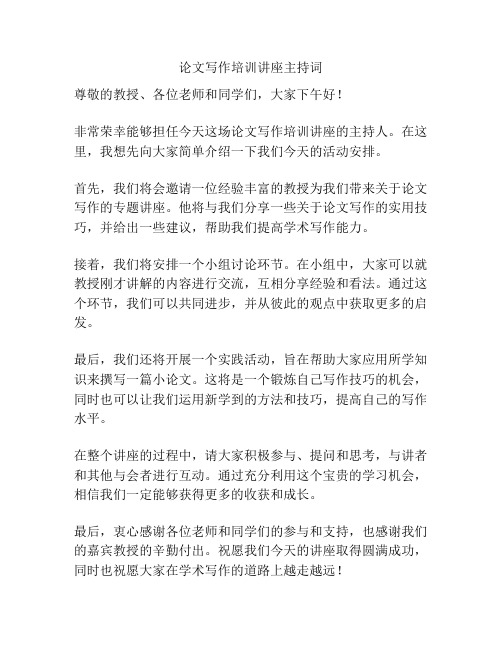
论文写作培训讲座主持词
尊敬的教授、各位老师和同学们,大家下午好!
非常荣幸能够担任今天这场论文写作培训讲座的主持人。
在这里,我想先向大家简单介绍一下我们今天的活动安排。
首先,我们将会邀请一位经验丰富的教授为我们带来关于论文写作的专题讲座。
他将与我们分享一些关于论文写作的实用技巧,并给出一些建议,帮助我们提高学术写作能力。
接着,我们将安排一个小组讨论环节。
在小组中,大家可以就教授刚才讲解的内容进行交流,互相分享经验和看法。
通过这个环节,我们可以共同进步,并从彼此的观点中获取更多的启发。
最后,我们还将开展一个实践活动,旨在帮助大家应用所学知识来撰写一篇小论文。
这将是一个锻炼自己写作技巧的机会,同时也可以让我们运用新学到的方法和技巧,提高自己的写作水平。
在整个讲座的过程中,请大家积极参与、提问和思考,与讲者和其他与会者进行互动。
通过充分利用这个宝贵的学习机会,相信我们一定能够获得更多的收获和成长。
最后,衷心感谢各位老师和同学们的参与和支持,也感谢我们的嘉宾教授的辛勤付出。
祝愿我们今天的讲座取得圆满成功,同时也祝愿大家在学术写作的道路上越走越远!
谢谢大家!。
论文写作技巧讲座(清华大学)_图文

不同于散文、新闻报导和报告文学,科 技论文的“生动”主要是借助合理的文章 结构、精辟的论述(尽可能做到深入浅 出)和简洁、通顺流畅的行文,以及图 文并茂的形式来增强可读性
• 科技论文切忌口语化,形容词不宜采用 过多,要尽量避免使用文学性的、带感 情色彩的非科技词语
博士、硕士学位论文是一类特 殊的科技论文。除应遵从科技 论文的一般原则外,还有其自 身的特点
自行设计的实验方法和装置应有详细说明和附图
必要时,可附上实验装置照片
图3.2 激光蒸发源与飞行时间质谱仪组合实验装置
“正文” 写作要领
合理的文章结构(提纲)
• 依据可靠的实验数据,通过理论分
析和逻辑推理,导出有价值的科学 结论
• 科学性、严谨性、逻辑性
③ 未经充分证明的设想、推测和见解不能列为结 论(不应出现“可能是”、“似乎是”等字眼)
…提出了多种结构模型来解释煤的分子结构, …
批注:何来“煤分子” ?
哈佛大学教授Westheimer从物理有机化学的角度阐 述了大自然为什么为生命选择了磷[1] , …
批注:翻译与原文不符。Westheimer教授文章的题目是
: “Why Nature Chose Phosphates?”
…磷酯及其酸酐统治着生物界[14] ,…许多新陈代谢 的中间体是磷酸酯,所以说哪里有磷哪里就有生命。…
⑻ 引用别人的插图要注明文献出处 (尊重知识产权,遵守“游戏规则”)
“引言”是学位论文一个独立部分。它可 列为“第一章,亦可不加章号
• “引言”(Introduction),不应更名为“ 前言”(Preface)。两者涵义大不相同
7. 正 文
学位论文的主体。是体现其科技价值 和学术水平的核心部分 • 正文的结构可因课题性质的不同而异 ;但均须合理划分章、节 • 以实验为主的学位论文一般包括“实验 方法”和“结果与讨论”两大部分
学术论文写作与发表规范lecture_1

1.2.2 针对不同读者群的学术写作
1. 2. 3. 4. 5. 专家(experts) 专业技术人员(technicians) 管理人员(managers) 外行(laypersons) 混合读者(mixed audiences)
1. 面向专家的写作
摘要、目录、引言、标题、参考文献 目录、
– 格式清晰
语言简洁:使用简单句避免过长复杂句 图表、专业术语
– 文脉清晰
背景、目的、方法、结论
简明(conciseness)
仅仅传递需要的信息 仅仅 策略:通过聚焦达到简明 –清晰的引言 –详细的提纲 –文章长度和范围的控制 –附录的使用 –准确的图表
一致(coherence)
科学、工程和公共政策委员会,美国科学院,美国 工程科学院,美国医学科学院. 怎样当一名科学家— —科学研究中的负责行为(NAS(National Academy of Sciences).On Being a Scientist(2nd ed) .Washington,DC:National Academy Press,1995)
教学内容
第一章 绪论 第二章 学术论文写作规范 第三章 学术论文与专利申请、会议文集 第四章 学术论文的发表过程和投稿技巧 第五章 学术期刊的评价体系、出版模式和发展趋 势 第六章 学术论文中涉及的科学研究诚信与科研道 德
参考文献
[美]罗伯特·戴,巴巴拉.盖斯特尔. 如何撰写和发表 科技论文(第六版).(How to Write and Publish a Scientific Paper(Sixth Edition)). 北京大学出版 社.2007 [美]查尔斯·李普森.郜元宝,李小杰译.诚实做学问: 从大一到教授. 华东师范大学出版社,2006 任胜利. 英语科技论文撰写与投稿. 科学出版 社.2004 [日]山崎茂明. 杨舰,程远远,严凌纳译. 科学家的 不端行为----捏造·篡改·剽窃. 清华大学出版社. 2005
学术论文写作讲座PPT课件

17
四、文献检索
② 索引检索。主要用于检索论文。
1. 《全国报刊索引—哲社版》,上海图书馆编辑; 2. 《复印报刊资料索引》,人民大学书报资料中心编印; 3. 《国内内部期刊索引》; 4. 《内部资料索引》(上海社科院图书馆编辑); 5. 《国外社会科学论文索引》,中国社会科学院情报研究
8
二、论文写作的基本步骤
1. 确定论文的选题 2. 搜集资料 3. 研究问题 4. 确定题目 5. 明确论点 6. 选择材料 7. 拟定写作提纲,确定论文框架 8. 执笔行文 9. 修改定稿
9
三、论文的选题
1. 论文选题的含义
➢ 这里所说的选题并不是一篇论文的标题, 是指确定论述的范围和科研方向。
学术、学位论文写作
周晓燕
1
一、什么是论文
1. 论文的内涵
➢ 所谓论文就是用来进行科学研究和描述研究 成果的理论性文章。
▪ 不属于论文的范畴:科普作品、文献综述、时评 散文、经验介绍、调查报告、计划文件等。
➢ 对于学位论文来说,它主要有两大功能:
▪ 一是考核,即考核学生的知识水平、专业深度与 基础的宽厚。它反映与学位相称的学识与能力。
②前人已经做过的题目,有的结论不对,或者 还有探讨的余地。
▪ 这类题目是对前人研究成果的发展性研究。
③有的题目已有别人讲过,但说法不一,甚至 分歧很大。
▪ 这类题目带有争鸣性质。对这类题目进行研究 时,要在众说纷纭的基础上,提出自己的意见, 应有新见解、新突破
13
三、论文的选题
5. 会计论文选题的禁忌
①有关课题或课题所属学科研究发展的水平和动态; ②有关课题现有的研究成果,包括有哪些专著、那些论文; ③有关课题的原始文献; ④有关该课题的基本理论、基本概念的文献; ⑤与课题有关的相关学科的成果
学习熊志刚如何进行论文写作讲座心得

学习熊志刚如何进行论文写作讲座心得在今年的暑假,我听了熊志刚老师关于如何撰写论文的讲座,受益匪浅,浅谈我的心得体会如下:一、要在学习和积累上动脑筋学术论文是学习和研究的阶段性总结,它既是教研成果的反映,也是学习成果的体现、为了能够写出高质量的学术论文,必须收集一定的信息,积累足够的资料,必须具有一定的专业知识水平和理论素养、因此,要把学习和积累作为提高撰写学术论文能力的“奠基工程”来抓,在学习和积累上多动脑筋。
1、资料的积累撰写学术论文,离不开参考资料、在研究某一个问题之前,应充分了解他人在这个问题上的见解、成果以及所做的工作,搜集尽可能多的背景材料,这样才能发前人之未发,成前人之未成。
2、知识的积累知识积累过程的本身就是一个完善自身的知识结构、智能结构的过程、丰富的知识积累,是撰写学术论文的必不可少的物质基础、要积累知识,不仅要动眼看,动脑想,还要动手写,将有用的东西记录在案,以便克服遗忘,真正变成自己的东西。
3、经验的`积累在教学实践中,我们创造了许多成功的经验,探索出了不少有益的规律,萌发了许多想法和感受、对这些想法和感受,都应随时做好记录,使之积累为论文创作的富贵财富。
二、要在选题和撰稿时下功夫通过学习和积累、研究和探索,为我们的论文写作奠定了基础、创造了条件、为了能够真正写出高质量、高水平的学术论文,十分需要的就是在选题和撰稿方面狠下功夫、1、从教育主管部门、专业学会和各类研讨会等指定的研究课题中,筛选出符合自己的教学实际和研究专长的典型问题作为论题,加以研究,撰写成文;2、在教学实践中,注意细心观察,勤于思考,就自己体验较深又感兴趣的地方触发灵感,加以提炼,将其上升到一定的理论高度,形成论题;3、通过认真阅读书刊杂志,在综合、借鉴别人科研成果的基础上,受到有关论点和问题的启示,发现论题,总结经验、推陈出新,发表自己与众不同的见解。
总之,发现问题的关键在于“留心”、只要平时留心,注意积累,好的选题是时刻都可能出现在你的思维之中的、一旦有了想法,就要立刻记下来,为以后进行筛选或提炼论题做好准备。
论文讲座观后感
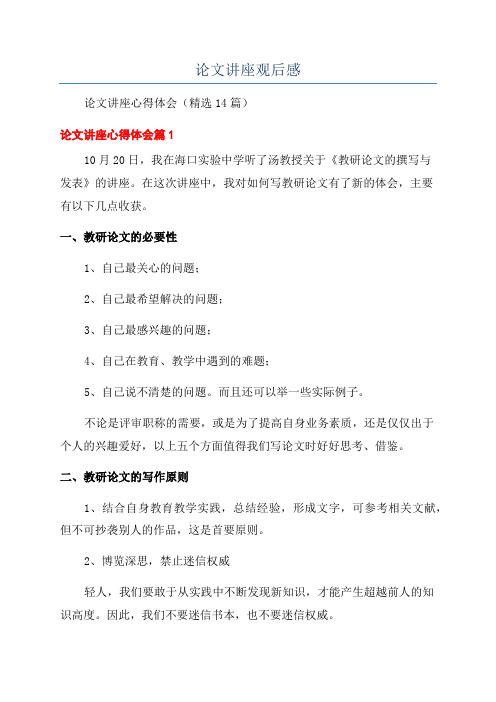
论文讲座观后感论文讲座心得体会(精选14篇)论文讲座心得体会篇110月20日,我在海口实验中学听了汤教授关于《教研论文的撰写与发表》的讲座。
在这次讲座中,我对如何写教研论文有了新的体会,主要有以下几点收获。
一、教研论文的必要性1、自己最关心的问题;2、自己最希望解决的问题;3、自己最感兴趣的问题;4、自己在教育、教学中遇到的难题;5、自己说不清楚的问题。
而且还可以举一些实际例子。
不论是评审职称的需要,或是为了提高自身业务素质,还是仅仅出于个人的兴趣爱好,以上五个方面值得我们写论文时好好思考、借鉴。
二、教研论文的写作原则1、结合自身教育教学实践,总结经验,形成文字,可参考相关文献,但不可抄袭别人的作品,这是首要原则。
2、博览深思,禁止迷信权威轻人,我们要敢于从实践中不断发现新知识,才能产生超越前人的知识高度。
因此,我们不要迷信书本,也不要迷信权威。
三、写作要求听了汤教授的讲座,我对写作要求有了更深刻的认识。
首先要结合自己的教育教学经验总结,也可以是其他老师做法的提炼,更多的是包括自己在内的众多老师的经验荟萃,具有理论与实践结合,感性与理性的特点,选取有一定理论色彩的典型案例。
其次,关于学术论文,一般都由假设开始,经过理论验证,事实论证,有一定的思辨行的研究。
而教学案例可以从教学方法、教育对象、教学模式、考试分析等入手。
以上写作要求,为自己今后练习写作指明了方向。
活到老学到老,做一名学习型的新时代教师是自己一直的追求。
论文讲座心得体会篇2暖和的阳光调皮地跳跃在泛着微微油墨香的纸上,获书在手,就像孔子席前的学生,心生几多向往,平添几分敬畏。
一日,偶然邂逅《于丹〈论语〉心得》。
圣贤把他们深刻的人生经验,穿越沧桑,传递到今天,他们在千古之前,缄默地微笑着,注视着,看我们仍然在他们的言论中收益。
,时常在忙碌中为自己的平庸感慨,平日非常喜欢听名师上课,然而与名师相比就更觉自己卑微、渺小,缺少职业幸福感。
无比崇敬地请教一位名师:语文教师最重要的功夫是什么读书!!名师真真切切地告诉我!那一刻,我好像突然有一种醍醐灌顶、豁然开朗的畅快和兴奋。
论文撰写讲座PPT优秀课件

论文的选题,必须以促进科学事业发展和解决现
实存在问题作为出发点和落脚点。选题要符合科
学研究的正确方向,要具有新颖性,有创新、有
理论价值和现实的指导意义或推动作用,一项毫
无意义的研究,即使花很大的精力,表达再完善,
也将没有丝毫价值。具体地说,我们可从以下三
个方面来选题。首先,要从现实的弊端中选题,
2021/5/26
9
四、理论性
学术论文与科普读物、实践报告、 科技情报之间最大的区别就是具有理论 性的特征。所谓理论性就是指论文作者 思维的理论性、论文结论的理论性和论 文表达的论证性。
学术论文在形式上是属于议论文的, 但它与一般议论文不同,它必须是有自 己的理论系统的,不能只是材料的罗列, 应对大量的事实、材料进行分析、研究, 使感性认识上升到理性认识。
从内容上看,学术论文更是富有明显的专业性。学 术论文是作者运用他们系统的专业知识,去论证或解 决专业性很强的学术问题。有时候,单纯从题目上还 难以判断是否学术论文,必须从内容上加以辨别。
从语言表达来看,学术论文是运用专业术语和专 业性图表符号表达内容的,它主要是写给同行看的, 所以不在乎其他人是否看得懂,而是要把学术问题表 达得简洁、准确、规范,因此,专业术语用得很多。
术问题已有研究成果的基础上,加以介绍或评论,从
而发表自己见解的一种论文。
• 4.综合型论文
•
这是一种将综述型和论辩型两种形式有机结合起
来写成的一种论文。包括如下几种:
2021/5/26
4
• 学年论文
学年论文就是高等院校要求学生每学 年完成的一篇学术论文,这是一种初级 形态的学术论文。其目的在于指导学生 初步学会对一学年所学专业知识进行科 学研究。每学年写一篇,逐步培养学生 的科研能力,为将来写毕业论文打基础。 撰写学年论文要在导师的指导下进行。
撰写学术论文基本知识讲座——第六讲 如何拟定论文结构提纲
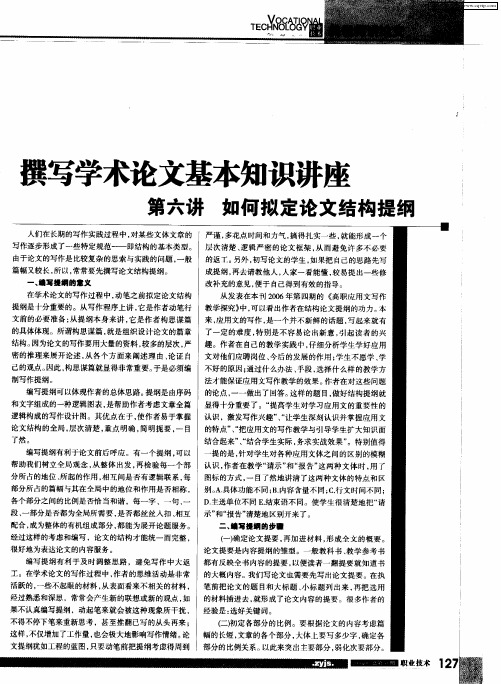
段、 一部分是否都为全局所需要 , 是否都丝丝入扣 、 相互 示” 报告” 和“ 清楚地 区别开来 了。 配合 , 成为整体的有机组 成部分 , 能为展开论题 服务。 都
经过这样 的考虑和编写 ,论文 的结 构才能统一而 完整 , 很好地 为表达论文的 内容服务 。
=、 写提纲 的步■ ■
了然。
结合起来” “ 、结合学生实际. 务求实战效果” 。特别值得
编写提纲有利 于论 文前后呼应 。有一 个提纲 , 可以 一提 的是 , 针对学生对各种 应用 文体之 问的区别 的模糊
帮助我们树立全局观念 , 从整体出发, 再检验每一个部 认识 , 作者在教学“ 请示” 报告” 和“ 这两种文体时, 用了 分所占的地位 、 所起的作用, 相互间是否有逻辑联系, 每 图标的方式, 一目了然地讲清了这两种文体的特点和区 部分所占的篇幅与 其在全局中的地位和作用是否相称, 别。 . A具体功能不同;. B内容含量不同;. C行文时间不同; 各个部分之间的比例是否恰当和谐,每一字 、 一句、 一 D主送单位不同E结束语不同。使学生很清楚地把“ . . 请
法才能保证应 用文写作 教学的效果 。 作者 在对这些问题
编写提纲可以体现作者的总体思路。 提纲是由序码 的论点 , 一一做出了回答。 这样的题 目, 做好结构提纲就
和文字组成 的一种逻辑图表 , 是帮助作者考虑 文章全篇 显得 十分重要 了 。“ 高学生对学 习应 用文 的重要 性的 提 逻辑构成的写作设计图。其优点在 于 , 使作者 易于掌握 认识 ,激发 写作 兴趣” “ 学生深刻认识 并掌握应用 文 、让 论 文结构 的全局 , 层次清楚 , 重点 明确 , 简明扼要 。 目 一 的特点 ” “ 、把应用文 的写作 教学与引导学 生扩大知 识面
硕士论文讲座心得体会

一、讲座背景在我国高等教育体系中,硕士论文是衡量研究生学术水平的重要标准。
为了提高研究生的论文写作能力,我国高校普遍开设了硕士论文讲座,邀请具有丰富经验和深厚学术背景的专家学者为研究生传授论文写作技巧和方法。
近日,我有幸参加了由我国某知名高校举办的硕士论文讲座,受益匪浅。
以下是我对此次讲座的心得体会。
二、讲座内容1. 论文选题的重要性讲座伊始,主讲专家强调了论文选题的重要性。
选题是论文写作的起点,一个好的选题能够为论文的顺利开展奠定基础。
在选择论文选题时,应遵循以下原则:(1)选题应具有学术价值,能够填补某一领域的空白。
(2)选题应与自己的兴趣和特长相符,有利于发挥自己的优势。
(3)选题应具有可行性,能够在规定时间内完成。
2. 论文写作的基本结构主讲专家详细介绍了论文写作的基本结构,包括:(1)引言:简要介绍论文的研究背景、研究目的和意义。
(2)文献综述:对相关领域的研究现状进行梳理和分析。
(3)研究方法:介绍论文采用的研究方法、实验设计等。
(4)结果与分析:对实验结果进行描述、分析和解释。
(5)结论:总结论文的主要发现,并对未来研究提出建议。
3. 论文写作的注意事项在论文写作过程中,主讲专家提醒大家注意以下几点:(1)遵循学术规范,尊重他人成果,避免抄袭。
(2)注意论文的逻辑性和条理性,使读者易于理解。
(3)注重论文的语言表达,力求准确、简洁、生动。
(4)认真对待审稿意见,不断完善论文。
三、心得体会1. 提高论文写作能力通过参加此次讲座,我对论文写作有了更深入的了解,认识到论文写作并非一蹴而就,需要掌握一定的技巧和方法。
在今后的论文写作过程中,我将努力提高自己的写作能力,为顺利完成论文奠定基础。
2. 明确研究方向讲座中,主讲专家对论文选题的原则进行了详细阐述,使我意识到选题的重要性。
在今后的研究中,我将结合自己的兴趣和特长,选择具有学术价值和可行性的课题,为我国学术事业贡献自己的力量。
3. 培养严谨的学术态度在论文写作过程中,主讲专家强调遵循学术规范,尊重他人成果。
论文讲座心得体会
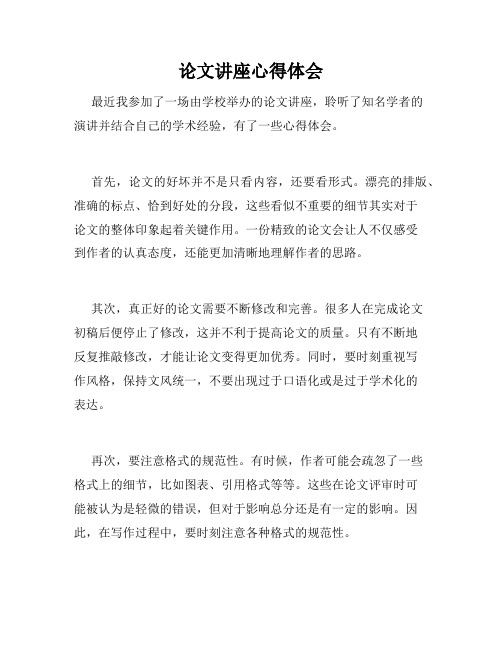
论文讲座心得体会
最近我参加了一场由学校举办的论文讲座,聆听了知名学者的
演讲并结合自己的学术经验,有了一些心得体会。
首先,论文的好坏并不是只看内容,还要看形式。
漂亮的排版、准确的标点、恰到好处的分段,这些看似不重要的细节其实对于
论文的整体印象起着关键作用。
一份精致的论文会让人不仅感受
到作者的认真态度,还能更加清晰地理解作者的思路。
其次,真正好的论文需要不断修改和完善。
很多人在完成论文
初稿后便停止了修改,这并不利于提高论文的质量。
只有不断地
反复推敲修改,才能让论文变得更加优秀。
同时,要时刻重视写
作风格,保持文风统一,不要出现过于口语化或是过于学术化的
表达。
再次,要注意格式的规范性。
有时候,作者可能会疏忽了一些
格式上的细节,比如图表、引用格式等等。
这些在论文评审时可
能被认为是轻微的错误,但对于影响总分还是有一定的影响。
因此,在写作过程中,要时刻注意各种格式的规范性。
最后,要胆大心细。
写论文需要对自己的观点和结论有足够的自信,同时也需要尽可能注意理性、客观。
写出来的论文可能会被不同的人解读为不同的意义,因此不要轻易放弃自己的观点,但也不要较劲到死去活来。
在细节方面也要注意,别让一些由于疏忽而导致的小错误占据主导地位。
总之,写好一篇论文不是容易事情,也是需要学习和不断提高的过程。
希望我的这些心得体会能够对那些有论文写作需求的同学有所启发。
撰写学术论文基本知识讲座——第七讲 关于学术论文的起草

定距离 , 至存在很大差距 。在动笔之前 , 甚 许多思想是模 几方面的非智力 因素 : 激发学生正确的学习动机 ; 养学 生 培
朔的 、 的 、 混乱 末成形的 , 只有经 过起草过 程 , 才能使它们明 浓厚 的学 习兴趣 ; 密切师生情感 ; 培养 强 的学 习意志。整
朗化 、 条理化 . 定型化。在行文过程中 , 作者运 用语 言文字 , 个 文章有 观点 、 有材料 , 有极强 的说服力 。 将原来 的命题 、 意 、 创 构思 、 局不断地加 以调整 、 布 补充 、 修 3 表达准确 , 、 语言简练。 文的特征应是说理性强 , 论 让人
、
定性帕意义。
是文章的基础 。 构段要完整统一 , 一是段落要集 中表达一个
l起草是构思的实现。起草是作者把 自已的设计 构思 意思 , 、 不要把 与本段段意无关的 内容写进同一段落里去。 二
草拟成文 。 将无形 的思想变为有形 的文章 的重要步骤 。 不管 是段落本 身要完整 , 一个 段落 的一 个意思说 细 、 透 , 要把 说 怍者的选题如何恰当 ,立意如何深刻 ,搜集的材料如何丰 不要笼而统之 , 浅尝辄止。 三是要 注意段 与 段之 间的相互关
3起草是 一个复杂艰苦 的写作实践过程 。它要求作者 格式规范等等。 文的语言要简练明白 , 、 论 力戒浮词套语 , 重复
继续积极思 考 , 深入研究 , 手脑 并用 , 内容到形 式不断进 累赘 。 从 为了引起读者的兴趣 , 尽管是学术论文 , 也不要板起僵 行琢磨 。起草过程是思想最活跃 、 注意力最集 中 , 作者的知 硬的面孔 , 在准确 、 简明的前提下 , 努力使论文生动起来 。本
富, 若不经过起草 阶段 , 这一 切都还停 留在“ 构思 ” 阶段 , 还 联与逻辑衔接 , 不要平摆浮搁 , 无根无 由。 在这 里 , 很多作者
《论文撰写讲座》课件

目录
• 论文撰写概述 • 论文选题与资料收集 • 论文结构与大纲 • 论文写作技巧与规范 • 论文修改与完善 • 论文答辩与评价
01
论文撰写概述
论文的定义与特点
总结词
阐述论文的基本概念和特点
详细描述
论文是一种学术性文章,旨在探讨某一领域的问题或现象,通过收集、分析和解释数据,得出 结论并提出建议。论文具有以下特点:科学性、创新性、客观性、严谨性和规范性。
02
论文选题与资料收集
选题的原则与技巧
原则
重要性、创新性、可行性
创新性
研究角度、方法、观点具 有新颖性
重要性
选题对学科发展、社会进 步有重要影响
选题的原则与技巧
• 可行性:具备完成选题的主客观条件 • · 可行性:具备完成选题的主客观条件
选题的原则与技巧
技巧 关注学术热点和前沿问题
从实际出发,结合自身兴趣和专业背景 善于发现和解决问题
准确无误
确保语言表达准确,避免歧义和模糊不清的情 况。
生动形象
运用比喻、拟人等修辞手法,使语言更具表现力和感染力。
逻辑思维的训练
结构清晰
合理安排论文结构,使文章层次分明、条理 清晰。
论证严密
在论述观点时,要提供充分的论据和证据, 确保论证严密。
逻辑连贯
保持文章内部的逻辑连贯性,避免出现前后 矛盾的情况。
04
获取官方数据和资料
文献综述的撰写
目的:全面梳理相关研究,找出研究空白和研 究趋势
01
确定主题和范围
03
02
步骤
04
搜集和筛选文献
分类整理和归纳总结
05
06
论文写作讲座.ppt

选题常见的问题2
2、选题偏离了中文学科的范围。
如“中国传统儒家文化对企业文化的影 响”
“找准市场竞争中的平衡点——浅析中 国电影期刊困境中的出路”
如何选题
选题过程中的犹疑甚至惘然,都是正常的。 毕业论文是个不小的工程 ,通过自己艰苦的 研究和不断的探索,才能完成。而整个曲折艰 难的写作过程,可以锻炼我们的思维和毅力, 正是提高自己综合能力的难得机会。
基本原则:选题就是提出有学术意义、自 己又有能力去解决的问题。
选题的标准
一是学术界少有关注,前人从未研究或较少研究过 的问题。现在有些学科似乎什么题目都有人做过了, 题目不那么好选了。比如现代文学就有一种半开玩笑 的说法,叫“拥挤的学科”,仿佛已经很少课题可选 了。时代在变化,人类认识能力在发展,新的知识点 不断出现。
选题的建议
3、某些课题特别需要材料的发掘运 用,而客观条件又限制了材料的利用, 即使题目有兴趣,也不宜去做。选题应 当充分考虑某一个课题的性质和难易程 度是否适合自己,本人的条件是否大致 具备,应当扬长避短,选择那种最能充 分发挥自己特长与能力的来做。
例如
对李白诗歌的评价从宋朝就已开始,著名 文学家王安石、苏轼、陆游等都对李白作品及 其生活背景有过论述。经历数百年研究后,今 天的“李白研究”分为几个主要部分:生平、 性格、思想研究、诗歌的艺术成就、诗歌艺术 渊源及对后人的影响等,在这几个主要领域中 还包含了若干研究分支,如“诗歌的艺术成就” 包含了研究李白诗的特质、风格、题材、内容 等方面的成就以及李白乐府诗的成就、绝句诗 的成就、律诗的成就等。
是有些推进,或有些启发的。这个 标准对我们来说可能高了一些,但 总是我们写论文的一种追求。
毕业论文的基本要求
三是要有一些理论性 问题的提出、分析和论证,要有抽象
论文写作讲座策划书3篇

论文写作讲座策划书3篇篇一论文写作讲座策划书一、讲座主题“提升学术素养,助力论文写作”二、讲座目的1. 帮助学生了解论文写作的基本要求和规范,提高论文写作的能力和水平。
2. 为学生提供一个学习和交流的平台,促进学生之间的学术交流和合作。
三、讲座时间[具体时间]四、讲座地点[具体地点]五、讲座对象[具体对象]六、讲座流程1. 签到入场:提前安排签到表和座位,引导听众有序入场。
2. 开场致辞:由主持人介绍讲座的主题、目的和流程,欢迎主讲嘉宾和听众的到来。
3. 主题演讲:主讲嘉宾进行主题演讲,介绍论文写作的基本要求和规范,包括论文的结构、内容、语言表达等方面的要求。
4. 互动环节:听众提问,主讲嘉宾进行解答,促进学生之间的学术交流和合作。
6. 结束离场:引导听众有序离场。
七、讲座内容1. 论文写作的基本要求和规范:介绍论文写作的基本要求和规范,包括论文的结构、内容、语言表达等方面的要求。
3. 论文写作的注意事项:介绍论文写作的注意事项,包括如何避免抄袭、如何引用参考文献、如何进行论文查重等方面的内容。
八、讲座宣传1. 海报宣传:在学校宣传栏张贴讲座海报,宣传讲座的时间、地点和主题。
2. 班级宣传:通过学生会向各班级发送讲座通知,宣传讲座的时间、地点和主题。
3. 网络宣传:在学校官方网站、公众号等平台发布讲座通知,宣传讲座的时间、地点和主题。
九、讲座预算1. 场地租赁费用:[X]元2. 设备租赁费用:[X]元3. 主讲嘉宾费用:[X]元4. 宣传费用:[X]元5. 其他费用:[X]元十、注意事项1. 提前安排好讲座的场地和设备,确保讲座的顺利进行。
2. 邀请专业的主讲嘉宾,确保讲座的质量和效果。
3. 提前做好讲座的宣传工作,吸引更多的听众参与。
4. 讲座现场要安排专人负责签到、引导和服务工作,确保听众的安全和秩序。
5. 讲座结束后,要及时清理场地,保持环境整洁。
[策划人姓名][日期]篇二论文写作讲座策划书一、讲座主题“研”途有你,写作无忧二、讲座目的1. 帮助同学们了解论文写作的基本要求和规范,提高论文写作的质量和效率。
论文写作指导讲座 学习心得

论文写作指导讲座学习心得08高校教师班云彩霞论文写作是每一个高校生的必修课,是高校学生学习研究的最后一关。
对于研究生来说,论文写作更是具有极重要的作用与意义。
历经几年的学习与研究,研究生在临近毕业时都要将其所感兴趣的研究课题做一个总结,为自己的研究生学习画上一个圆满的句号。
而这个圆满的句号就是论文。
论文可以全面地反应一个研究者对研究课题的理解是否全面,分析是否透彻,是检验一个研究者是否合格的标尺。
因此,论文写作对于每一个学习者都十分重要。
为了提高自身的文化层次,更好地完善自己,我于2008年荣幸地进入内蒙古大学,开始了我的研究生学习。
经过将近两年地学习,我圆满的结束了各门功课地学习。
在总结了学习的知识基础上,我确定了研究方向,进入了毕业论文写作阶段。
为了让我们更好的完成论文写作,学校为我们安排了段老师的论文写作指导讲座。
此次讲座对我帮助很大,为我的论文写作打下了坚定的基础。
首先,论文写作指导讲座为我明确了论文写作的目的与意义。
之前我认为论文写作只是为了顺利毕业。
在听完讲座后,我明白了论文写作是对自己学习的总结,能反映学习者的学习成果。
其次,论文写作指导讲座为我提供了明确的写作与研究程序,让我不会在写作时手忙脚乱,为我节省了很多的时间与精力。
按照讲座的指导,我在写作前做好了很多必要的准备工作,为写作过程奠定了坚实的基础,起到了事半功倍的效果。
第三,论文写作指导讲座在很多细节上给出了明确的说明与建议。
由于论文写作经验的不足,我们对于论文写作的许多细节问题都只是一知半解。
而段老师的讲座对于这些方面都给了我们很好的指导。
比如,论文的格式,论文的组成部分,如何标注引用部分,怎样做注解,等等。
听完讲座后,我的脑海中已经可以勾勒出论文的大概框架了。
最后,讲座对于我起到了很大的心理上的作用。
对于论文写作,我一直都很惧怕,因为不明白要怎们写。
但听了讲座之后,我明白了论文写作的方法,目的,因此我放松了许多,也可以轻松地开始写作论文了。
- 1、下载文档前请自行甄别文档内容的完整性,平台不提供额外的编辑、内容补充、找答案等附加服务。
- 2、"仅部分预览"的文档,不可在线预览部分如存在完整性等问题,可反馈申请退款(可完整预览的文档不适用该条件!)。
- 3、如文档侵犯您的权益,请联系客服反馈,我们会尽快为您处理(人工客服工作时间:9:00-18:30)。
Refining a research question
read broadly and widely to find a subject about which you are passionate. narrow your focus to a single question: be disciplined and not overambitious. Be prepared to change or modify your question if necessary. Be able to answer the question ‘Why am I doing this project?’ Read up-to-date materials. Discuss your ideas with your supervisor and lots of other people. Attend specialized conferences in your area. Work through the implications of your research question. Condense your research into two sentences. Ask yourself: what will we know at the end that we did not already know?
Writing the literature review
The review should describe and synthesize the major studies related to the topic of the research. It should also demonstrate the relationship between your project and what else has been done in the particular area.
Purpose of each section of a research proposal Criteria for assessing research proposals the logic of your argument a well-focused research question, set of research objectives, or hypothesis the width and depth of your reading the feasibility of your project a critical approach to literature justification of the project through the literature understanding of current issues on your topic matching of the methodology and methods to the research questions.
Four areas to be focused on in a research thesis (by Phillisp and Pugh 2005) background to the study : a state-of-theart review of the field of study, including current developments, controversies and breakthroughs, previous research and relevant background theory; focus of the study: what is being researched and why; data used in the study: justification for the choice of data; contribution of the study: importance of the project for the field of study.
Research proposal and Literature Review
Topics to be covered
1. Writing a research proposal 2. Writing the background chapters
Writing a research proposal
Details to include in a research proposal
1. 2. 3.
4.
5.
Hale Waihona Puke 6.7. 8. 9. 10.
a clearly focused statement of the overall purpose of the proposed research; a clearly focused research question/hypothesis; precise definitions of the key terms in the research questions/s or hypothesis; an awareness of key research that has already been carried out in the particular area; an appropriate choice of research approach for the particular question or problem a section highlighting any anticipated problems and limitations in the proposed study; a statement illustrating why the study is significant ; a proposed timetable for the research; a list of references related to the proposal; appendices containing any material that will be used or adapted for the study.
A dissertation should demonstrate: An original investigation or the testing of ideas; competence in independent work or experimentation; An understanding of appropriate techniques as well as their limitations; An expert knowledge of the published literature on the topic under investigation; Evidence of the ability to make critical use of published work and source materials; An appreciation of the relationship between the research topic and the wider field of knowledge; The ability to present the work at an appropriate level of literary quality. A doctoral thesis demonstrates: All of the above, plus A distinct contribution to knowledge
A checklist for developing a research proposal
a summary of Nunan (1992) and Bell’s (1999) work 1. Draw up a shortlists of topics. 2. Select a topic for investigation 3. Then, formulate a general question. 4. Next, focus the question. 5. Decide on the aims and objectives of the study or formulate a hypothesis. 6. Think about the data that need to be collected to answer the question 7. Draw up an initial research plan 8. Read enough to be able to decide whether the project is on the right lines 9. Finally write up a detailed proposal, including definitions of key terms used in the proposal.
Writing the background chapters
Introduction: It includes writing the literature review and chapters which describe the theoretical framework to a study. Particular writing skills covered include summarizing and critiquing previous research, adopting a stance and using reporting and evaluative verbs. Attention is given to the issue of plagiarism and how you can avoid it.
